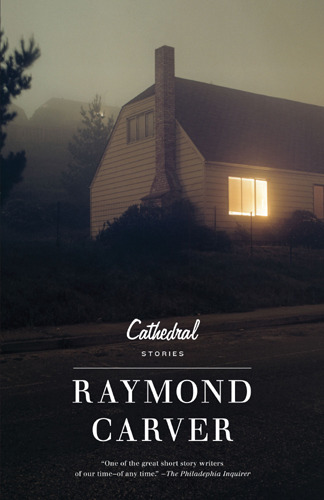Country: USA
Genre: Literary/Short Stories
Pages: 228
Reading Carver is like this supreme aesthetic trip to me. He's a writer to who I will forgive a lot. I don't mind that his stories don't have a complete or traditional story arc per se. His stories are meant to be read sentence per sentence, paragraph per paragraph and page per page. Carver has a music, a bit like Fitzgerald does. It's not as majestic, but it appeals to subtle emotions and touches your soul in a very unique way. Cathedral has twelve stories, less than What We Talk About When We Talk About Love, but they are considerably bulkier. They go up to thirty pages (A Small, Good Thing) and they are way more ambitious than what Carver got me used to. Cathedral shows again that he's at his best when he doesn't try to bother with a storyline.
The stories of Carver are always carrying strange, difficult emotions to describe. Where I'm Calling From for example (one of my favorites) starts with drinking buddies, chit-chatting at the tavern, when one of them starts recalling this weird childhood memory that has nothing to do with the discussion. His friends keep asking questions and the discussions keeps sliding into more and more personal matter. Carver has seized how to illustrate the need to talk, the unexpressed emotional distress that is read in between the lines. There is no logical beginning or end to Where I'm Calling From, but when you finish the story, you have this odd feeling that you have loved to hear more from that character, to sit with him in the tavern and listen to his problems. It's not easy to explain, but it's quite a strong feeling given by a short story.
It's been said by many reviewers that the real subject of Carver's stories is American life. This is the best way to describe his work. He writes about what other writers deliberately leave aside. Those moments, those gaps where life is not as good as it's supposed to be, where people are truly themselves and not who they aspire to be. I know it sounds boring, but it's not. Carver doesn't do in choking realism, but in moments of lucidity that are so clear, that they are almost mystic. The story Cathedral for example is about communicating images to a blind man, which the characters do successfully enough to make it feel almost unreal. I'm not blind myself so I can't tell you how drawing somewhat helps to perceive the world, but the moment described by Carver is magical.
Cathedral lives up to Raymond Carver's legacy, but you have to give it the necessary time and dedication to hear it's music. It's a book that you have to read slowly, in a silent and well-lit room (preferably with sun light). The alleged founder of U.S Minimalism (he hasn't defined the style himself, but rather influenced people) never gives himself without demanding a little work from his readers. Cathedral is a work of great empathy and vulnerability who only the people who take the time for it will appreciate. My favorite stories were: Where I'm Calling From, The Train, Fever and Cathedral. It's the perfect vacation read for the bookish, literary tweeps, who want something for the beach or for the hotel terrace, under a burning sun with a cold drink.

